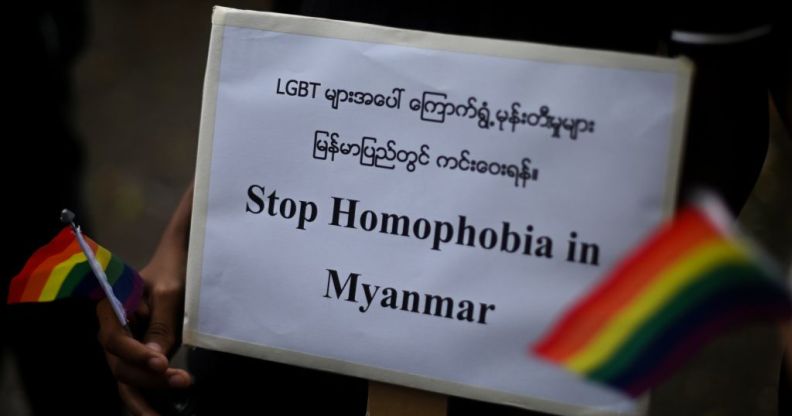Damning report reveals extent of brutality, violence and persecution LGBT+ people face in Myanmar, where gay sex is illegal

YE AUNG THU/AFP via Getty
A damning report has revealed the shocking extent of violence and persecution faced by LGBT+ people in Myanmar and has recommended urgent law reform.
The report – which was produced by the Denmark-Myanmar Programme on Rule of Law and Human Rights – tells the stories of LGBT+ people in the Asian country to illustrate the extent of the shocking treatment queer people experience.
In November 2016, transgender woman Alinkar and her friends – who are make-up artists – were travelling by motorbike to see a client when they were stopped by police.
“The police asked us where we were going, but before we could answer, they were hitting us,” she revealed.
“They forced us to kneel with our hands behind our heads. They falsely accused us of dealing drugs and mocked us for being transgender.”
She said one of the officers “derisively” asked the group if they were men or women.
“When we said that we are transgender, the police kicked us brutally. A police officer asked me if parts of my body were fake. When I said my body is real, the office kicked me again and demanded oral sex.”
She was subjected to even more abuse when she refused and they were only let go when their client came to help them.
The report recommends urgent legal reform to better protect LGBT+ people in Myanmar.
Various other LGBT+ people in Myanmar shared their stories in an attempt to illustrate how difficult life is for the people in the conservative country.
In order to prevent anti-LGBT+ discrimination, the report calls on parliament to urgently repeal Section 377 of the Penal Code which prohibits gay sex. They also call on parliament to reform or amend other laws which are used to persecute LGBT+ people.
A police officer asked me if parts of my body were fake. When I said my body is real, the office kicked me again and demanded oral sex.
They also ask parliament to provide transgender people in Myanmar with legal gender recognition and ask for anti-discrimination laws.
The report insists that police stop arresting LGBT+ people on “the mere suspicion of ‘engaging in unnatural sex.’” It also accuses police of “selectively” targeting individuals based on the country’s colonial-era laws.
Legal system makes LGBT+ people ‘marginalized and vulnerable,’ activist says.
Aung Myo Min, executive director of Equality Myanmar, writes in a preface to the lengthy report that there have always been LGBT+ people in Myanmar – but says their role has been limited due to discriminatory cultural perceptions.
“Myanmar’s criminal laws and justice system make LGBTIQ more marginalized and vulnerable, particularly Penal Code Article 377,” he writes.
“This is a provision inherited from British colonial rule, and it continues to criminalize consensual same-sex sexual conduct.
“Although this Act is not strictly enforced, law encorcement officers have been using this to intimidate, harass, and arrest LGBTIQ people on other charges. Many of the LGBTIQ members are subject to all forms of mistreatment by criminal laws and are not protected by the justice system in Myanmar.”
However, he also said that LGBTIQ activists are “working together like never before” to make life better.
“They prove that they are part of society, not the problem of society. Nonetheless, there is still a long fight ahead over ending the discrimination based on sexual orientation and gender identity. We need both legal protection and widespread acceptance by society.”

